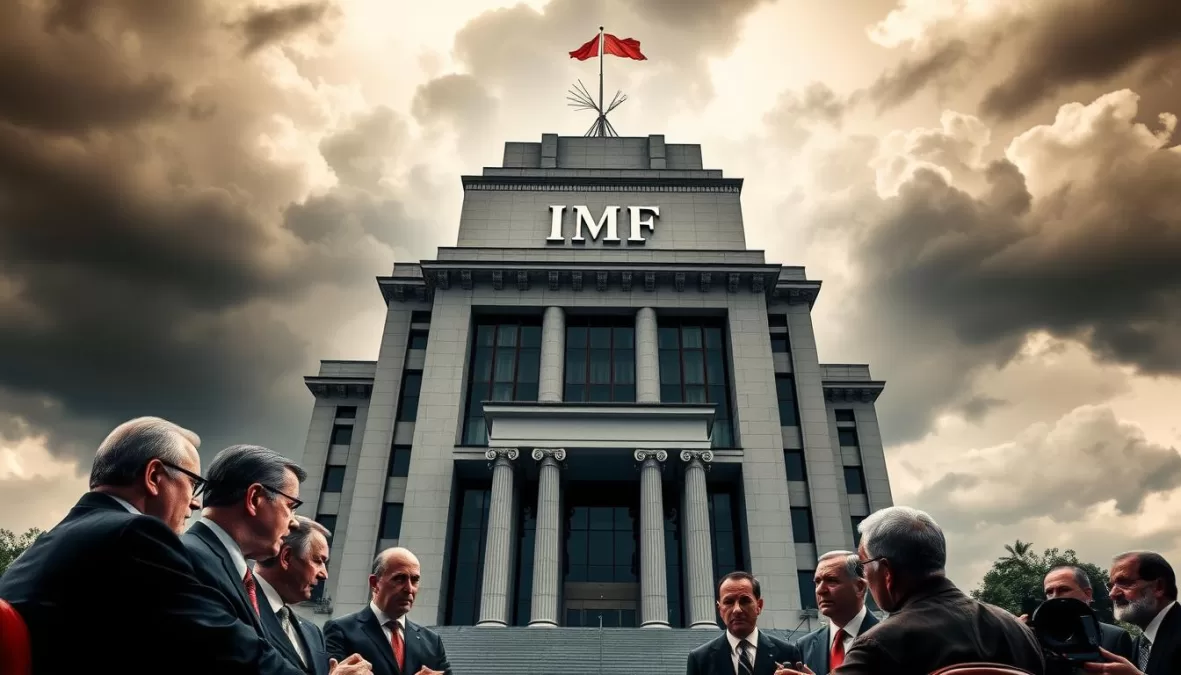The International Monetary Fund (IMF) has recently approved a significant financial package for Pakistan, amounting to approximately $2.4 billion. This decision has sparked intense debate, particularly in neighboring India, where concerns have been raised about the potential misuse of these funds.
The latest bailout is part of Pakistan’s ongoing efforts to stabilize its economy under the IMF’s economic reform and climate resilience programs. The financial assistance is expected to have far-reaching implications for the region, affecting economic stability and geopolitical dynamics.
As the situation unfolds, we will provide live updates and in-depth analysis of the key details and implications of this significant development in international finance.
Key Takeaways
- The IMF has approved a $2.4 billion financial package for Pakistan.
- The funding is aimed at supporting Pakistan’s economic reforms and climate resilience.
- India has expressed concerns over the potential misuse of the funds.
- The bailout is expected to have significant implications for regional stability.
- The financial assistance is part of Pakistan’s efforts to stabilize its economy.
- The IMF’s decision reflects the complex geopolitical dynamics at play.
Recent IMF Approval: $2.4 Billion Financial Package
In a major economic boost, the IMF’s Executive Board has approved a $2.4 billion financial package for Pakistan. This significant financial assistance is divided between two distinct funding mechanisms designed to address different aspects of Pakistan’s economic challenges.
Breakdown of the Financial Package
The financial package is structured to support Pakistan’s economic reform program and address its balance of payments issues.
$1 Billion Under Extended Fund Facility (EFF)
The Extended Fund Facility (EFF) portion amounts to $1 billion, bringing the total disbursements under this arrangement to approximately $2.1 billion out of the total $7 billion approved in September 2024. This funding is specifically designed to support Pakistan’s economic reform program, focusing on addressing structural weaknesses and helping the country overcome medium-term balance of payments problems.
$1.4 Billion Under Resilience and Sustainability Facility (RSF)
The larger portion, $1.4 billion, comes under the Resilience and Sustainability Facility (RSF), a newer IMF initiative aimed at helping vulnerable countries address climate change challenges and natural disaster preparedness. This RSF funding will support Pakistan’s efforts to improve disaster response coordination, enhance water resource management, and strengthen climate-related risk disclosures by financial institutions.
The IMF’s decision was made after its Executive Board meeting on May 9, where the first review of Pakistan’s economic reform program supported by the EFF arrangement was completed. The voting process faced scrutiny, with India choosing to abstain, citing concerns about Pakistan’s track record with previous IMF programs.
- The financial package is aimed at supporting Pakistan’s economic reform program and addressing balance of payments issues.
- The EFF portion focuses on structural weaknesses and medium-term balance of payments problems.
- The RSF funding supports climate change challenges and natural disaster preparedness.
Pakistan’s IMF Loan History and Economic Outlook
Pakistan’s history with IMF loans is a complex and multifaceted one, spanning several decades. The country’s reliance on IMF financial support has been a recurring theme in its economic narrative.
Pakistan’s Track Record with IMF Programs
Pakistan has maintained a long-standing relationship with the IMF, receiving financialsupportthrough variousprogramsfor nearly three decades.
In the 35 years since 1989, Pakistan has had disbursements from the IMF in 28 years, indicating a persistent reliance on external financial assistance.
28 Years of IMF Disbursements Since 1989
The frequency of IMF assistance has intensified recently, with Pakistan participating in four separate IMF programs in just the last five years (since 2019).
Four IMF Programs in the Last Five Years
This frequent reliance on IMF loans raises questions about the effectiveness of these interventions and the country’s ability to achieve sustainable economic independence.
Current Economic Indicators in Pakistan
Despite concerns about Pakistan’strack recordwith IMF programs, recent economic indicators suggest some positive trends.
According to the IMF, Pakistan has demonstrated strong implementation of the EFF-supported reforms, achieving a primary fiscal surplus of 2.0% of GDP in the first half of FY2025.
Inflation Reduction and Foreign Exchange Reserves
Inflation was historically low at 0.3% in April, and gross foreign exchange reserves rose from $9.4 billion in August 2024 to $10.3 billion by the end of April 2025.
IMF’s Assessment of Pakistan’s Economic Stability
The IMF’s continued support reflects both Pakistan’s persistent economic challenges and the international community’s strategic interest in maintaining the country’s financial stability.

India’s Opposition to the IMF Loan to Pakistan
In a significant display of diplomatic dissent, India abstained from voting on the IMF’s $2.4 billion financial package for Pakistan. This decision reflects India’s strong concerns regarding the implications of the loan.
India’s Abstention from Voting
The Indian government chose to abstain from voting during the IMF Executive Board meeting on May 9. The IMF’s voting system does not allow for negative votes; directors can either vote in favor or abstain.
Ministry of Finance Statement
The Indian Ministry of Finance released a statement expressing serious concerns about Pakistan’s track record with previous IMF programs. It highlighted that Pakistan has received IMF disbursements in 28 out of 35 years since 1989, indicating a pattern of dependency.
Concerns About Pakistan’s Implementation Record
India’s concerns centered on Pakistan’s poor implementation record of IMF programs, raising questions about the efficacy of such financial assistance.
Cross-Border Terrorism Funding Concerns
India’s primary objection was the potential misuse of IMF funds for supporting cross-border terrorism. Government officials argued that financial assistance to Pakistan could indirectly fund activities threatening regional security.
Potential Misuse of Funds
The concern was that the IMF loan could be used to support state-sponsored terrorism, thereby undermining global values and exposing funding agencies to reputational risks.
Reactions from Indian Officials Including Omar Abdullah
Jammu and Kashmir Chief Minister Omar Abdullah criticized the international community and the IMF for approving the loan amidst heightened tensions. He suggested that the funds could indirectly support Pakistan’s military actions against Indian territories.

| Concerns Raised by India | Description |
|---|---|
| Pakistan’s Track Record | Poor implementation record of IMF programs |
| Cross-Border Terrorism | Potential misuse of IMF funds for terrorism |
| Reputational Risks | Exposure of funding agencies to risks by enabling state-sponsored terrorism |
Implications Amid Rising India-Pakistan Tensions
Amidst the rising military tensions between India and Pakistan, the IMF’s decision to provide a $2.4 billion bailout has sparked controversy. The recent attacks on 26 locations across India, followed by retaliatory strikes, have intensified concerns about the potential misuse of international funds.
Critics argue that the financial assistance could indirectly support Pakistan’s military operations and cross-border activities that India classifies as terrorism. The IMF’s Deputy Managing Director, Nigel Clarke, acknowledged Pakistan’s progress in restoring macroeconomic stability, but also noted that “risks to the outlook remain elevated” due to rising geopolitical tensions.
The situation highlights a fundamental tension in international financial policy: balancing economic stability objectives against security concerns. Indian officials from New Delhi to Jammu and Kashmir have been providing live updates on their opposition to the funding, arguing that international financial institutions should consider the broader implications of their disbursements.
The controversy surrounding this IMF bailout may have long-term implications for how international organizations approach funding decisions in conflict-prone regions. For citizens in both countries, the situation creates uncertainty about whether these funds will ultimately contribute to economic stability and development or further complicate an already tense regional dynamic.





